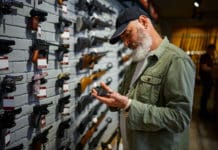In the dark days before the Internet, encyclopedia were the internet. The handful of players (e.g. Britannica, World Book) sold their the information to the entire country. Millions of folk. With very different belief systems. And so encyclopedia companies had to couch their words very, very carefully. A small entry on “abortion” or “Jesus” could offend a large demographic segment and sink the entire series. Encyclopedias were censored by self-appointed committees; academics determined to be ruthlessly “objective.” (They now wear T-shirts that say “I was PC before it meant Personal Computer.”) I’d forgotten just how useless encyclopedias were until I read this morning’s entry in the iEncyclopedia You Asked: Who Owns Guns in America? I didn’t ask, but now that we’re here . . .
If I was wondering who owns guns in The Home of the Well-Regulated Militia, I’d Google. Which would force me to define terms. What kind of demographic info do I need? Location, income, ethnic makeup, political affiliation? Is it available from a reliable source? What does “reliable” mean, anyway.
iEncyclopedia writer Robert J. Spitzer doesn’t even try to address these question. Instead, the professor and “author of 13 books” (including The Politics of Gun Control) crafts a “reply” as vague as it is bland.
America has a tradition of national gun ownership and use dating to the nation’s origins. Yet the true nature of that tradition has been often romanticized, exaggerated, or distorted. Even though modern Americanculture includes groups that support gun traditions and use, only some Americans share these beliefs.
Americans own about 270 million guns, nearly one for every person in the country; some Americans own more than one gun, and millions have no firearms at all. Gun owners are found throughout the country, but are concentrated in rural and in the South. Long guns (rifles and shotguns) outnumber handguns by a ratio of 2-to-1. Most Americans who own long guns use them for hunting and sporting; most handguns are obtained for personal self-protection. Nationwide, gun ownership has gradually declined: In the 1960s, about half of American homes had at least one gun; today, guns are found only in about one-third of homes.
We get embedded ads (deleted here), but no citations. So how do we know that iEncyclopedia’s information is accurate? How about we Google “gun ownership in america”? First up: a 2005 Gallup poll.
The poll, conducted Oct. 13-16, finds that 4 in 10 Americans report they have a gun in their homes, including 30% who say they personally own a gun and 12% who say another member of their household owns it. These results show essentially no change since this question was last asked in 2000. At that time, 27% of Americans said they personally owned a gun and 14% said another household member owned one.
So which is it: 1/3 or 2/5ths? And that’s the joy of the Internet: lots of information sources competing for credibility, forcing researchers to question the information provider, dig for original source material and weigh the evidence—or read Wikipedia and call it good. Anyway, that’s on the factual level. On the more contentious socio-political level, things get even hinkier.
Gun ownership and use has continued to spark national debate. Most Americans support stronger gun laws, but also respect the preferences of gun owners. About 30,000 Americans are killed with firearms each year by gun suicide, homicide, and accident. About 80 percent of all gun crimes are committed with handguns. Guns are sometimes used by civilians to thwart crime, and researchers continue to debate the types of defensive gun uses that are legitimate.
Seems Mr. Spitzer was wounded in the Great Taste, Less Filling Wars of the 80s. Never mind. Online or off, the encyclopedia is about as relevant to today’s intellectual enquiry as cassette tapes are to high fidelity. I mean, audio quality, not the John Cuzak movie (not shown). Look that up in your Funk and Wagnalls. Or not.





Robert, I think you’ll agree that the biggest problem with such reports is that there is no way to gauge the accuracy of the data. Even if the people collecting the original source data keep strict records and conform their data collection to whatever the ethical standards of data collection are (no, I don’t know either) the fundamental issue is that you still have to assume that the people giving you the information are telling the truth. And there’s no way to verify that.
Just as nations and corporations are vague and nonspecific about their security measures (for fear that too much info would make it easy for ne’er-do-wells to compromise it) people tend to be cagey and somewhat evasive about their own personal security measures.
The absolute, God’s-honest truth answer to the two questions – how many guns are in private ownership in America, and how many households have at least one gun – is simply this: Nobody knows. Lots of people can make estimations, studies, and wild-ass-guesses, but nobody really knows, and probably nobody ever will.
And BTW, I don’t think this is a bad thing at all, though undoubtedly there are those (mostly on the pro-gun-control side) who do think it’s a bad thing.
Comments are closed.